#colson whitehead
Quote
Make a career of humanity. Make it a central part of your life.
Colson Whitehead, The Nickel Boys
177 notes
·
View notes
Text
Colson Whitehead on Making Novels Half-Asleep
I deleted my Substack because, you know, its founders are evil. But this post I wrote last October feels relevant for writers going into the New Year. If it's TLDR, skip down to the "What Meant Everything to Me" heading.
Writing with Chronic Fatigue
I went to the Brooklyn Book Festival last weekend! It was pure magic after so many years of being away from the English-speaking book world. I felt like someone on rations finally allowed to eat my fill, gulping down book panels and author talks.
Colson Whitehead Goes to Church

One of my favorite festival events was a talk with Colson Whitehead in the St. Ann and the Holy Trinity Church. I’m a big fan of hosting cultural events in places of worship.
Colson Whitehead imparted insights that felt like gospel for writers. For those unfamiliar, Whitehead has published nine novels, two nonfiction books, and won two Pulitzer prizes. His book The Underground Railroad is one of my favorites of all time.
But I did not always like Whitehead’s work. I first had to read his 2003 essay collection The Colossus of New York in university, and it struck me as self-obsessed, MFA-brand New York nonsense. Like, he romanticized Port Authority, the dirty hellhole bus station where, in 2003, I was an elementary schooler waiting nervously for buses that were always late while getting continuously harassed by grown-man casino gamblers dressed like lumberjacks.
I really hated Whitehead’s cheery romanticizations. I wouldn’t pick up another Whitehead book until 2017.
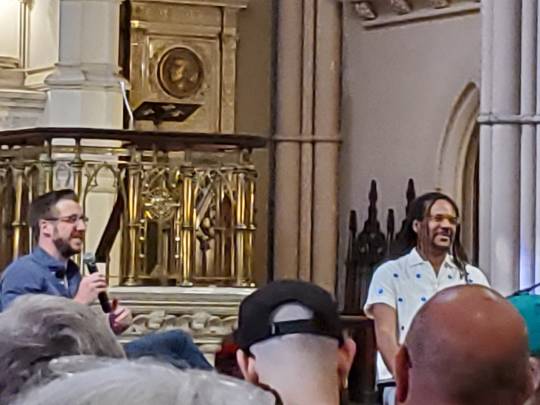
(^just an HD image of Colson Whitehead)
Add Whitehead to the list of authors who wrote some of my most detested 1-star reads before they published the 5-star books of my heart: NK Jemisin, Maggie Stiefvater, Jeff Vandermeer, Colson Whitehead—almost all of my favorite contemporary writers put out messy, uncompelling books before they entered the realm of the virtuoso.
“I wrote a book called The Intuitionist,” Whitehead said at the church, referring to his debut, “and everyone hated it. So I thought, ‘Okay, I need to do better next time.’”*
It was surreal to hear a writer speak with such open eyes about the trajectory of their own career. Like, I knew I hated Whitehead’s early work. I didn’t realize that he knew it, too.
(It’s worth mentioning that someone who came up to ask Whitehead a question during the Q&A said, “The Intuitionist is my favorite book of all time.”)
But that wasn’t the insight that meant the most to me.
Nothing Is a Joke
Whitehead made joke after joke about chronic fatigue. He never used the words “chronic fatigue”; he never referred to his own health. But he repeatedly described scenarios that resonated with me as someone who lives with fatigue and hypersomnia:
“I spend most of my day just sleeping,” he said. “I mean, coming out here [to the book event]? Really big deal for me. Glad I could make it.”
And everyone laughed, but I don’t think that’s the kind of joke you make unless you mean it. I don’t think it would even dawn on a non-fatigued individual to make it.
What Meant Everything to Me
When Whitehead described his writing process, he said he writes about eight pages a week.
Eight pages a week.
Estimating 250 words/page, that’s 2,000 words per week. Or as he said, “32 pages per month, 320 pages after ten months. I find it adds up.”
He writes, he said, about three days each week. So that’s a little over 600 words each time he sits down to write.
To put this into perspective: If I write fewer than 2,000 words in a single writing session, I don’t consider it to have been a proper session. In less than a month, hundreds of thousands of people will join in NaNoWriMo and try to write at least 1,666 words every day for a month straight.
We live in a world where writers are encouraged to crank it way, way up, sacrificing what writing actually is in an attempt to maximize monetization of a craft that is not easily monetized. Romance writers give advice online for how to write just one draft of a book, no revision needed. Self-publishing writers crank out novella after novella to feed to the Kindle Unlimited machine. Everyone wants to be done with their book in a month. Memes proliferate in which writers scold themselves for daydreaming, plotting, outlining—for doing anything at all that isn’t literal putting words to the page, as if those other things weren’t integral to novel-making.
I thought I was immune to that hustle-and-grind mindset, because I know what writing a book actually entails for me and I have no intention of cranking out a first-draft story for KDP.
But I had never once considered giving myself the patient grace that Colson Whitehead shows himself.
“I don’t push myself,” he said. “Writing is hard work. On days when I’m not up to it, I revise instead. Just tinker with my last paragraphs.”
He joked about how, during the pandemic, he had to write his novels while his young son was at home. Whitehead said he usually writes a paragraph or two, and then sleeps for a few hours.
Daddy, why are you always in the dark? his son asked during the lockdown.
It’s part of my process! he joked. But I think he also meant it.
Novel Advice
He’s not the first writer to give this advice; this isn’t the first time I’ve heard it. Maggie Stiefvater wrote her first book only on Wednesday evenings, raising her children and working the rest of the time. Terry Pratchett wrote 400 words each day before he became a full-time writer.
But these are stories of pre-success, the ways we need to struggle when our creative lives are stuffed into the spare corners of our weeks. And when your week doesn’t have spare corners because you’re barely trudging on as it is, that advice doesn’t feel encouraging.
But Colson Whitehead is already successful. And this is still how he allots his writing time: In low-pressure, long-term, sustainable accumulations.
2,000 words a week.
I’ve known for a long time that I can no longer wait for healthy, clearheaded days to write. I don’t have them anymore. But it sort of sounds like Colson Whitehead doesn’t have many of them to spare, either, and yet he wrote the most energetic Harlem heist book I could ever want (Harlem Shuffle). He wrote the most literary zombie apocalypse book imaginable (Zone One). He has an oeuvre that brought enough readers to fill church pews, the line to see him wrapping all around the block. And he built this work, according to him, in between long naps.
In fact, his writing style probably hinges on his method. He’d be writing very different kinds of books if he wrote quickly. His just-a-few-paragraphs-a-day approach*** is probably how he writes descriptions with so many precise details, like these images of a party-supply store after the apocalypse hits:
The unit had completed a sweep of a party-supply store, a narrow nook on Reade that had been washed off Broadway into a low-rent eddy. Dusty costumes hung from the ceiling as if on meat hooks: cowboys and robots from chart-busting sci-fi trilogies, ethnically obscure kiddie-show mascots, jungle beasts with long tails intended for the flirty tickling of faces. Kingdoms’ worth of princesses and their plastic accoutrements, stamped out on the royal assembly line, and the requisite Naughty Nurse suspended in the dead air, tilting in her rounds. Do Not Expose to Open Flame. For Amusement Only. The masks had been made in Korea, delivering back to the West the faces they had given the rest of the globe: presidents, screen stars, and mass murderers. The rubber filament inevitably snapped from the staple after five minutes. The graft wouldn’t take.
I used to imagine Colson Whitehead as just being so impossibly brilliant that he spit this stuff out on the fly, leagues beyond the rest of us mere mortals. Now I see it differently: It happened laboriously, made by a tired, human brain full of faith in its own accumulative productivity.
Going Forward
No more for me, I think, of harsh deadlines and crank-it-out word counts. Instead: I need to provide accommodations for my own writing life. I must consciously factor in my own fatigue and stop demanding that I strain myself in ways unsustainable for a long and fulfilling creative life. Instead: Crank it down. Way down. And take naps between the paragraphs.
2,000 words a week.
Thanks, Colson Whitehead, for being honest about the work. We need more of that in the book world.
----
*None of these quotes are verbatim, just based on memory.
**This is similar to how both Donna Tartt and Nabokov have described their own writing processes. Maybe we spend so much time screaming at new writers to “just write” that we don’t talk about how slowness and care may enhance the quality of our prose.
75 notes
·
View notes
Text
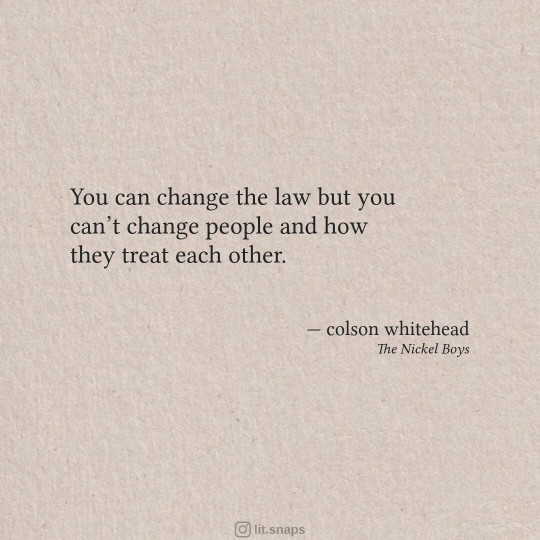
46 notes
·
View notes
Text

And America, too, is a delusion, the grandest one of all. The white race believes—believes with all its heart—that it is their right to take the land. To kill Indians. Make war. Enslave their brothers. This nation shouldn't exist, if there is any justice in the world, for its foundations are murder, theft, and cruelty. Yet here we are.
―Colson Whitehead, The Underground Railroad (2016). Banned in Florida, and essential reading for every high school student.
[Robert Scott Horton]
#Colson Whitehead#The Underground Railroad#banned in Florida#high school#quotes#Robert Scott Horton#racism#history#storytelling#white supremism
39 notes
·
View notes
Text
Round 1
It goes by many names: “The Crisis,” “The Dark Years,” “The Walking Plague,” as well as newer and more “hip” titles such as “World War Z” or “Z War One.” I personally dislike this last moniker as it implies an inevitable “Z War Two.” For me, it will always be “The Zombie War,” and while many may protest the scientific accuracy of the word zombie, they will be hard-pressed to discover a more globally accepted term for the creatures that almost caused our extinction.
-World War Z, Max Brooks
I remember being born.
-Seraphina, Rachel Hartman
Even in death the boys were trouble.
-The Nickel Boys, Colson Whitehead
#polls#tournament poll#books#reading#round 1#world war z#max brooks#seraphina#rachel hartman#the nickel boys#colson whitehead
31 notes
·
View notes
Text
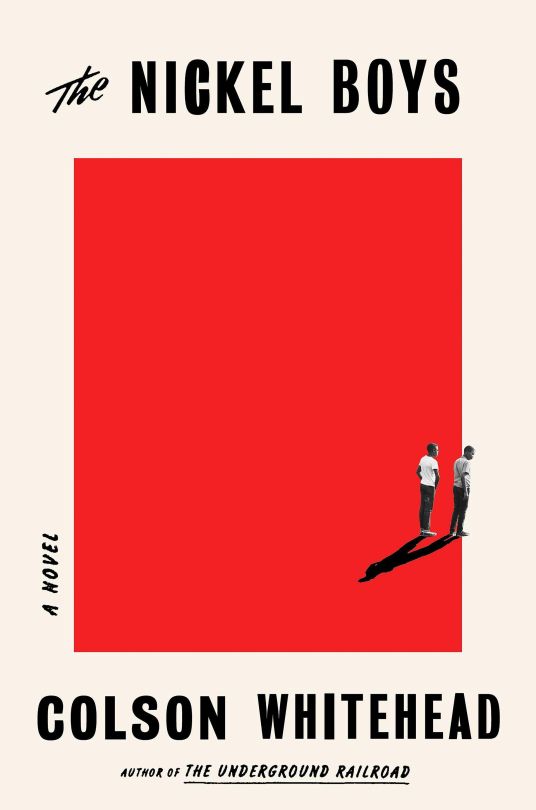
Happy 54th, Colson Whitehead.
15 notes
·
View notes
Quote
I was nostalgic for everything big and small. Nostalgic for what never happened and nostalgic about what will be, looking forward to looking back on a time when things got easier.
Colson Whitehead, Sag Harbor
30 notes
·
View notes
Text

Currently reading Underground Railroad by Colson Whitehead. This is the story of one woman’s will to escape the horrors of slavery. This book is devastating and terrific at the same time.
“Cora didn't know what optimistic meant. She asked the other girls that night if they were familiar with the word. None of them had heard it before. She decided that it meant trying.”
23 notes
·
View notes
Text
Her şeyin bir ederi vardı ve bu eder değiştikçe yine her şeyi değiştiriyordu.
14 notes
·
View notes
Text
We must believe in our souls that we are somebody, that we are significant, that we are worthful, and we must walk the streets of life every day with this sense of dignity and this sense of somebody-ness.
The Nickel Boys by Colson Whitehead
4 notes
·
View notes
Text
Emotional Damage:
Cry your heart out over these novels:
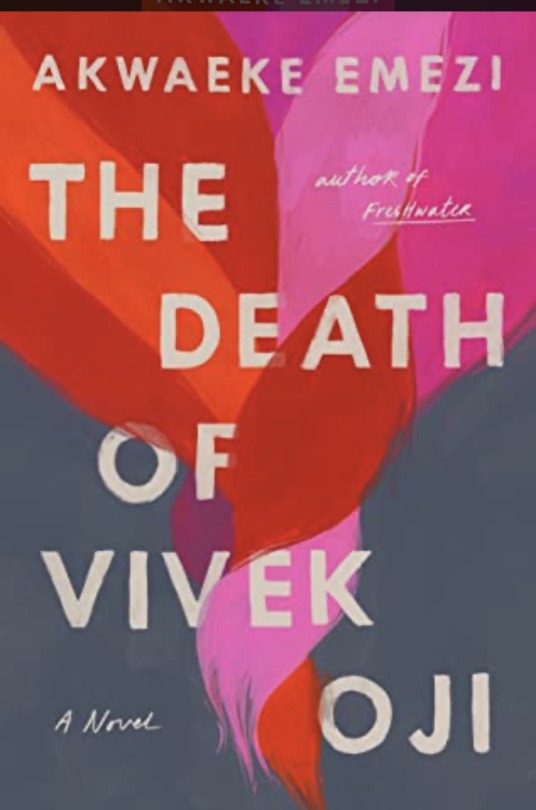
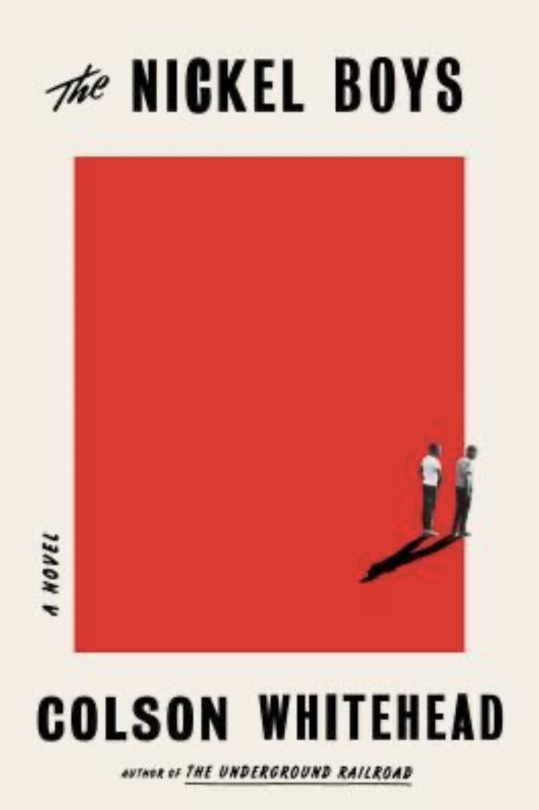

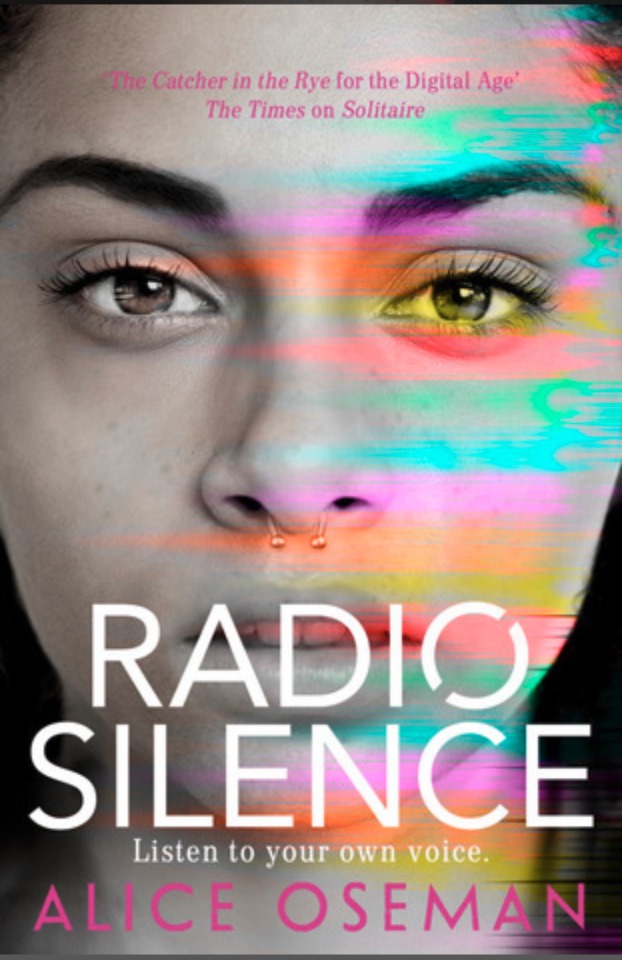
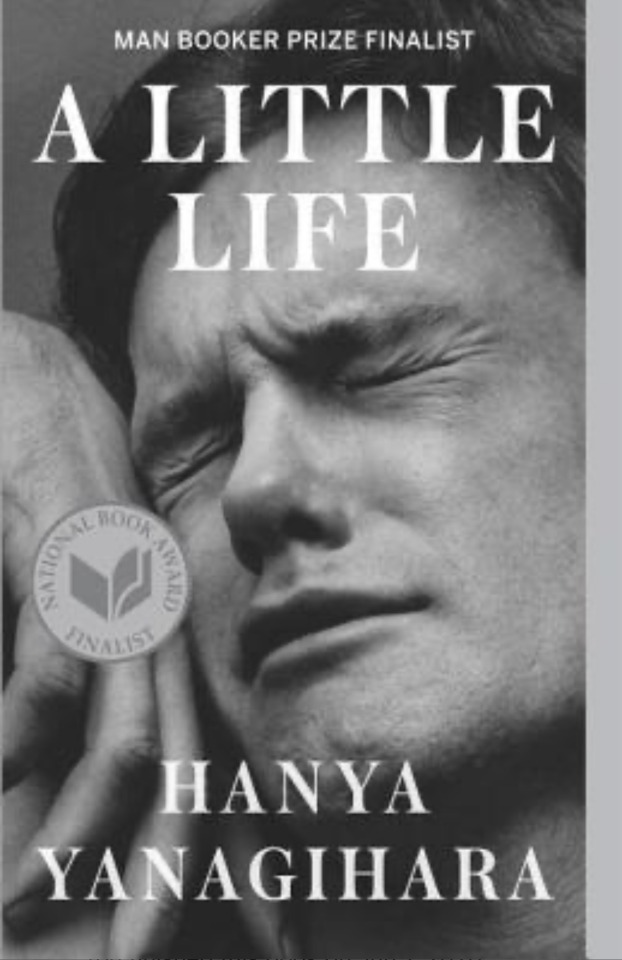

#books#literature#book recommendations#fiction#sad books#moving books#tragedy#a little life#the death of vivek oji#the nickel boys#radio silence#hanya yanagihara#colson whitehead#tiffany mcdaniel#alice oseman#john knowles#book covers
19 notes
·
View notes
Quote
People get rid of plenty when they move — sometimes they're changing not just places but personalities.
Colson Whitehead, The Nickel Boys
166 notes
·
View notes
Text
The adjective/imagery per capita of a Colson Whitehead novel is off the charts. In the best way of course.
Look at this, mamma mia every page is like this:
Out on the pavement, Carney could barely see. The people on the street were shadow-shapes moving around him. It was a normal afternoon and he'd been shunted outside it. A cabbie pounded on his horn at an old biddy jaywalking and she cursed him out, dragging a battered green suitcase. One of the street preachers yelled, "I'm saving souls here!" and raised his arms as if parting seas. Down the block, two newsboys from rival papers fought over the turf in front of a cigar store. Their dropped tabloids fanned out on the sidewalk and trembled in the exhaust of a city bus. Carney squinted. Here was every street corner in this city, populated by noisy, furious characters who were all sales-men, delivering dead pitches for bum products to customers who didn't have a fucking nickel anyway. He moved one foot then the other.
- Harlem Shuffle, Colson Whitehead
#like you are so violently IN the scene that sometimes I lose track of the overarching plot bc i’m just walking down the street in extreme#detail which is actually not bad because it done so well that when#the heavy imagery and narration breaks and the plot slams back in its so startling and exciting UGGHHHH he’s so good#colson whitehead#harlem shuffle#double shot
2 notes
·
View notes
Text
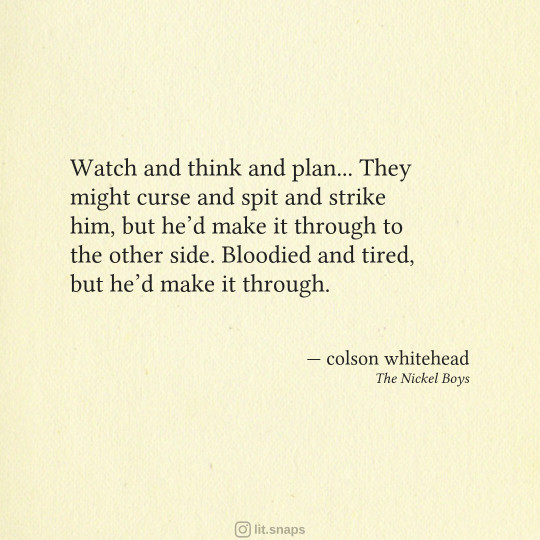
18 notes
·
View notes
Text
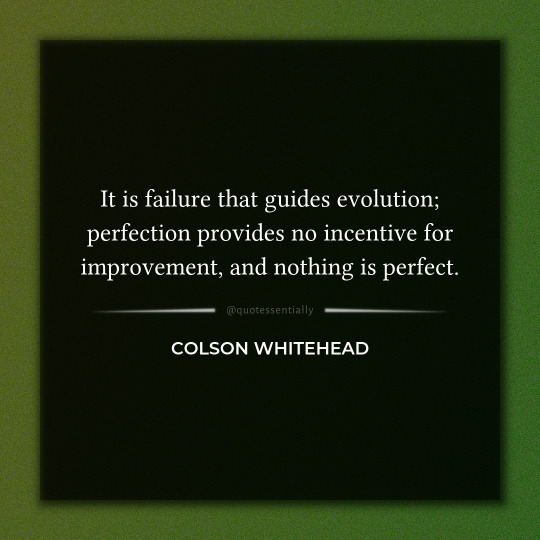
From Colson Whitehead’s The Intuitionist
11 notes
·
View notes
Text
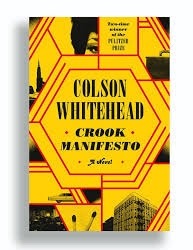
2 notes
·
View notes